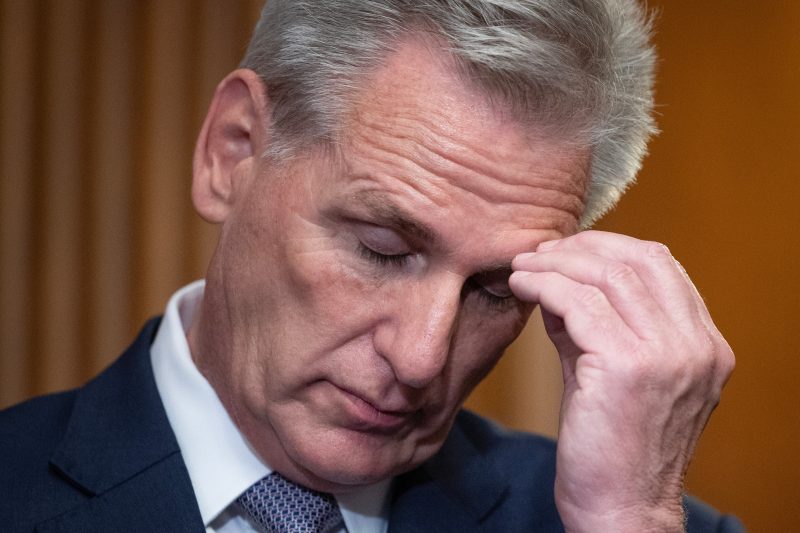Over the past century, the period during which the House leadership saw the most intraparty turnover came in the 1930s. John Nance Garner, the head of the majority Democratic caucus, left to serve as vice president under Franklin D. Roosevelt in 1933. Henry Rainey took over, only to die the next August. He was succeeded by Jo Byrns, who died in 1936. Then William Bankhead became House speaker, a position he held for four years, until he died. It all has a very “Monty Python and the Holy Grail” castle vibe to it.
For the next few decades, things were relatively stable. Then Republicans lost the House in the 2006 midterms. For the past 17 years, the tumult has been on the Republican side. Not because leaders slowly progressed through the ranks until, aged, they assumed the top position in their party. But because they were figuratively killed off, representations of authority in a party increasingly oriented around rejecting such authority.
Speaker Kevin McCarthy (R-Calif.) was elected to the position in January. As you will recall, this was not an easy victory. In fact, it was a Pyrrhic one. Hard-right members of the Republican caucus blocked his election, demanding concessions including the ability to call for his ouster on demand. On Monday, Rep. Matt Gaetz (R-Fla.), who never voted for McCarthy as speaker in the first place, did just that.
The pressure on McCarthy comes despite his having served as minority leader while Democrats controlled the House from 2019 until that point. But as minority leader, he could join his Republican caucus in railing against the people in control of the chamber. Elevated to speaker, that control landed in his lap. McCarthy has tried to direct that anger from the caucus at President Biden with some success, but hostility to leadership is, unfortunately for him, not a limited resource.
The pattern for Republican House leaders in recent years has been consistent. After Dennis Hastert resigned after the 2006 midterms, John Boehner took over. He was elected speaker when his party retook the House in the 2010 midterms, a national election defined by backlash against President Barack Obama and the Washington establishment. This was the tea party election, and the frustration that motivated Republican voters was very much not limited to Democrats on Capitol Hill.
Boehner tried to maintain his grip on the party, but it only became more difficult. The rise of Donald Trump in 2015 and 2016 hardened the edge of hostility to establishment Washington. Anger that had mostly manifested at the congressional level spread to the presidential race. Trump ran against “the swamp” and any Republican leader who fit that description.
Boehner gave up just as Trump was pulling away from the pack in the 2016 Republican primary. The House Republican conference, elected before the Trump era, selected Paul Ryan to replace him. But Ryan, the 2012 Republican vice presidential candidate, was similarly unable to keep the fervor against leadership at bay. How could he? He did not run for reelection.
So you see the erosion of Republican speakerships. Since Hastert left, Democrats have had one speaker, Nancy Pelosi, who served for eight nonconsecutive years. Republicans have had three speakers: Boehner for just under five years, Ryan for just over three years and McCarthy for eight months now.
It is possible that McCarthy retains his position despite the imminent vote to remove him. But that would seem to require that Democrats orchestrate a way to ensure that McCarthy survives the vote, something they have indicated a disinterest in doing.
And even if they did, engaging support from across the aisle would only add fuel to the fire from the fringe right, as Gaetz made clear on Monday. Working with Democrats is anathema to many Republicans, but with narrow House majorities, Republican leaders have little choice. This is a problem that will plague any Republican speaker in this era, McCarthy or otherwise. A century ago, the turnover issue was House leaders losing their positions due to the natural limits on longevity. That is no longer the problem.






























